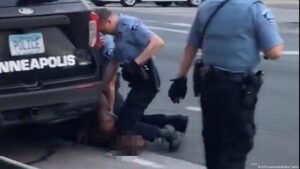 Have you ever had a complete stranger change your life? It happened to me, and I want to share the story of how it happened. It’s a story I’ve never told, but one that I think is important.
Have you ever had a complete stranger change your life? It happened to me, and I want to share the story of how it happened. It’s a story I’ve never told, but one that I think is important.
The story begins in May 2020. We were in the midst of a pandemic that had killed tens of thousands. I knew it was going to get worse, but I had no idea how many lives it would eventually extinguish.
My emotions were raw. I had just ended a relationship a month earlier. I was hurt and lonely. The nightly update on the number of people who had died from Covid made matters even worse. People were dying, families were being destroyed, and all but the most essential businesses were being shut down. In addition, the country was being torn apart politically. The federal government seemed completely unable or unwilling to effectively address the pandemic, instead turning it into another battle in the country’s ongoing culture war. It was a difficult, depressing time.
Then Derek Chauvin, a white police officer in Minneapolis, snuffed out the life of a black man named George Floyd, for no reason other than that he could. The whole ugly episode was captured on video and was served up to a national television audience, setting off protests and counter protests across the country.
Our divided country became further divided, pitting those who were outraged by the murder of George Floyd against those that didn’t seem to care that a police officer had murdered yet another unarmed black man. I was solidly on the side of the former, but what could I do, sitting alone at home, emotionally frayed and angry? Then I read this poem:
What Does One Say?
What does one say,
when George Floyd is executed in broad daylight,
and a seventeen-year-old girl films him calling for breath and his dead mother,
and the world looks on as the officer tucks his hands in his pockets?
What does one say,
when the streets fill with righteous anger,
and the refrain of “no justice, no peace” rises like incense,
and the sounds of flash bangs crack the night sky?
What does one say,
when suddenly the church doors are flung open,
and the wounded stumble in to find help,
and the traumatized step in to find sanctuary?
What does one say,
when, for two nights, fires rage all around,
and fist-sized embers rain down,
and smoke covers the block like a blanket?
What does one say,
when the President uses tear gas against his own people,
and the Bible becomes little more than a prop,
and protesters—who are pleading for Black lives—are labeled “thugs” from the nation’s most prominent pulpit?
What does one say,
when a neighborhood, once rich with groceries, becomes a desert overnight,
and businesses burn to the ground,
and nonprofit partners return to find nothing but wily flames and ashes?
What does one say,
when white supremacists show up to incite violence,
and black hawks circle round and round,
and neighbors—ages twenty to ninety—set up lawn chairs on the street corners to keep watch?
What does one say,
when the refrain “all lives matter” is again wielded like a sword,
and some choose to attend to the ninety-nine at the expense of the one,
and white moderates look at the uprising and say that “they just aren’t doing it right”?
What does one say,
when the church—the last public building—becomes the epicenter of disaster recovery,
and smells not-so-faintly of tear gas and smoke and sour milk,
and any lingering desire to protect the structure for an unknown tomorrow is eclipsed by the want to use it today for love?
What does one say,
when tens of thousands from every nation and every creed show up in need of food and basic necessities,
and goods enough appear each day,
and volunteers descend from far and wide—each called to be present for this moment?
What does one say,
when violence and tenderness join hands,
and institutional racism and righteous anger come face-to-face,
and grief and love embrace,
and scarcity and abundance kiss?
What does one say?
Truth is, I’m not sure.
But what I know is this:
Black Lives Matter.
You are not alone.
And God is here, already at work building something new.
That poem was written by Ingrid Rasmussen. Ingrid is the Lead Pastor at Holy Trinity Lutheran Church in Minneapolis. Even now, when I re-read it, I get choked up just like I did when I read it for the first time on June 7, 2020. The poem brought all of my emotions—the hurt, the anger, the loneliness, the helplessness—to the surface.
I wanted to scream, to cry, to reach out, to make a difference, but I didn’t know how. I was just an older, middle-class, white guy. What did I have to say about the George Floyd murder or institutional racism that was valid and meaningful to anyone? I had lots of thoughts, lots of feelings, but no voice. In my experience, people like me just didn’t speak up. It was easier to stay quiet, to not make waves, to blend into the background. It was safer to keep opinions inside, to not ruffle any feathers, to not alienate friends or family.
Then I read Pastor Rasmussen’s poem and something inside me changed.
You see, Pastor Rassmussen is white, like me. She’s Lutheran, like me. I didn’t think people like us spoke up about racism and inequality. But if Pastor Rasmussen could speak up so powerfully and so clearly, then maybe I could too.
I began voicing my opinion on social media, the most convenient way to communicate, especially during a pandemic. I got into arguments, I lost some friends (both online and in real life), and I angered some people that thought I was being a radical for having the audacity to say that black people in the United States were entitled to equality and justice under the law.
I’m not sure what I expected when I decided to speak up. I sure didn’t set out to single-handedly change the world. Maybe I hoped that something I said would change a mind or two. Truthfully, I don’t know if anything I said made a difference. But I don’t think that was the point. I saw an injustice, and thanks to Pastor Ingrid Rasmussen, I found my voice and spoke up. What happened after that was and is out of my control. But until our country and our government treats all people with respect, equality, and justice—regardless of the color of their skin, the God they worship, the country they hail from, or the person they love–I’ll keep speaking up. It’s what each of us should do.
I still have never met or spoken to Pastor Rasmussen. Even so, I am so thankful to her for the courage, eloquence, and commitment to doing the right thing she displayed in the aftermath of the George Floyd murder.
Thank you, Pastor Rasmussen. Your words helped me find my voice, and I am eternally grateful.
